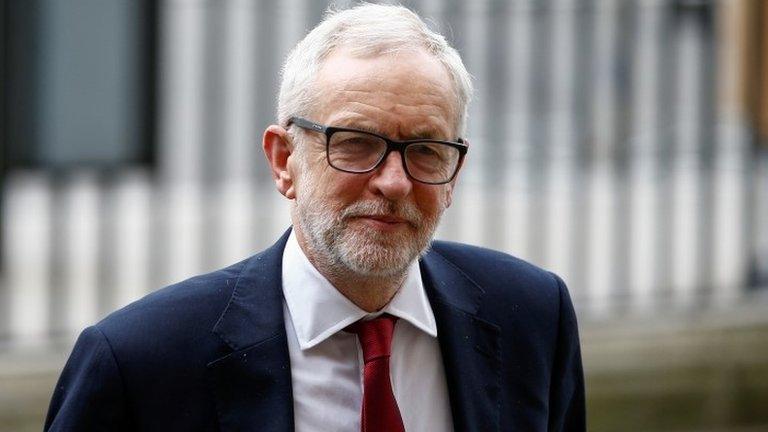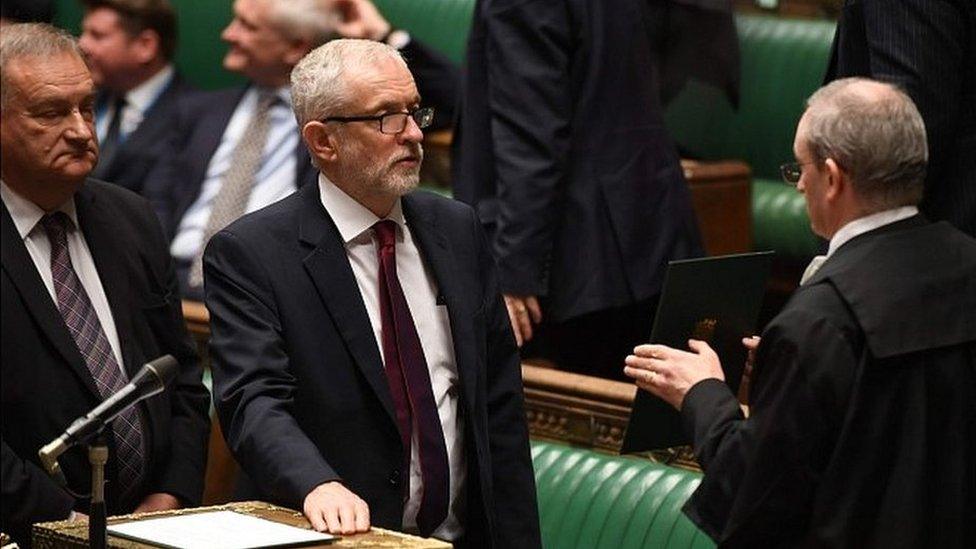Starmer urged not to let Corbyn back into parliamentary party
- Published

Labour leader Sir Keir Starmer is being urged not to let Jeremy Corbyn return to the parliamentary party.
It comes after the party readmitted the ex-leader as a member, following his suspension for suggesting political opponents had dramatically overstated the scale of anti-Semitism.
Mr Corbyn issued a statement saying he regretted any "pain" caused.
Sir Keir is coming under pressure from groups including the Board of Deputies of British Jews to take further action.
BBC political editor Laura Kuenssberg said a decision had not yet been taken on whether to restore the Labour whip to Mr Corbyn, which would allow him to sit once more as one of its MPs.
A panel of five members of Labour's ruling National Executive Committee decided to readmit Mr Corbyn after he had clarified the comments which had led to his suspension, stating that he had not belittled concerns about anti-Semitism.
His remarks had been made in response to a damning Equalities and Human Rights Commission report.
The former leader's critics have said his case should not have been heard until the party had set up an entirely independent complaints process - as recommended by the human rights watchdog.
'Backward step'
Following the decision to readmit Mr Corbyn, Sir Keir tweeted that it had been a "painful day for the Jewish community and those Labour members who have fought so hard to tackle anti-Semitism".
He said Mr Corbyn's remarks were "wrong and completely distracted from a report that identified unlawful conduct in our tackling of racism within the Labour Party".
Sir Keir said he stood by the commitments he made after the report, adding: "That must mean establishing an independent complaints process as soon as possible in the new year."
He is coming under pressure privately from some of his own MPs - and publicly from the Board of Deputies of British Jews - to take further action.
Former Labour MP Dame Louise Ellman, who quit the party over anti-Semitism concerns last year, said the decision was a "backward step".
"What Keir Starmer and the chief whip should do now is to refuse to restore the whip to Jeremy Corbyn, in that way they can show that they are determined, as they have said they are, to rid the party of this dreadful stain," she told BBC Newsnight.
BBC political correspondent Iain Watson says he has been told that at least one Jewish MP is considering resigning if Mr Corbyn is welcomed back at Westminster.


Jeremy Corbyn has been readmitted as a Labour party member, but it is not, according to Keir Starmer's team, automatic that he would also be allowed to sit once more as a Labour MP.
That is the decision Sir Keir has been trying to make overnight and he is expected to make it this morning.
He is going to have to make that decision before Prime Minister's Questions at noon because that is an absolute political gift for the prime minister - who himself has had an absolutely shocking political week.
If Sir Keir refuses to allow Mr Corbyn back on the backbenches that would provoke another pretty grim skirmish with those in Mr Corbyn's tribe on the left of the party.
But if you allow him to sit again as a Labour MP then you punch the bruise of the Jewish community and infuriate many Labour MPs.
Sir Keir was adamant he would not interfere in the process of whether or not Jeremy Corbyn would be allowed back in as a party member.
But it was suggested to me he has found himself, from a political point of view, trapped by the process.
He was so eager not to interfere, but has now been landed with this other political grenade.

In a statement earlier on Tuesday, Mr Corbyn - who is currently an independent MP - said it was "not his intention" to say anti-Jewish racism should be tolerated, and that he regretted the "pain" caused.
His statement added: "To be clear, concerns about anti-Semitism are neither 'exaggerated' nor 'overstated'.
"The point I wished to make was that the vast majority of Labour Party members were and remain committed anti-racists deeply opposed to anti-Semitism."
It is not yet clear whether Mr Corbyn will face further sanctions from the party.
Its general secretary, David Evans, took the decision to suspend him in October, although Sir Keir endorsed it.
The ECHR's report found Labour had breached the Equalities Act over its handling of complaints of anti-Semitism during Mr Corbyn's time in charge.
Labour said Mr Corbyn had been suspended "for a failure to retract" his words.
Following his readmission, the Islington North MP said: "I hope this matter is resolved as quickly as possible, so that the party can work together to root out anti-Semitism and unite to oppose and defeat this deeply damaging Conservative government."
'Zero tolerance'
But President of the Board of Deputies of British Jews Marie Van Der Zyl described the decision as "an absolute sham" and said Mr Corbyn's reinstatement had been "rushed through and judged by a politicised panel stuffed with his own supporters".
The Jewish Labour Movement called the decision to readmit Mr Corbyn "extraordinary", adding: "After his failure of leadership to tackle anti-Semitism, so clearly set out in the EHRC's report, any reasonable and fair-minded observer would see Jeremy Corbyn's statement today as insincere and wholly inadequate."
Karen Pollock, chief executive of the Holocaust Educational Trust, said: "What message does this send? Zero tolerance either means zero tolerance or it's meaningless."
The co-chairman of the Conservative Party, MP Amanda Milling, has written to Sir Keir, saying: "You have claimed that Labour is 'under new leadership', but now is the moment to prove it - Mr Corbyn should be expelled permanently."
However, Len McCluskey, general secretary of the Unite union and a close ally of Mr Corbyn, called the reinstatement a "correct, fair and unifying decision".
He said Labour had to "move forward" in implementing the EHRC's recommendations and "redouble our efforts to inspire voters" about Sir Keir's policies, acting as a "unified and strong" party.
James Schneider, former director of strategic communications for the ex-Labour leader, argued that Mr Corbyn hadn't said anything that was "either factually or morally wrong and was not anti-Semitic and did not breach any party rules".
Jenny Manson, co-chairman of pro-Corbyn group Jewish Voice for Labour, told BBC Newsnight that "an awful lot of us are very happy he (Mr Corbyn) is back in the party" and would be "very sad indeed" if the whip is taken away from him.
- Published18 November 2020

- Published30 October 2020
